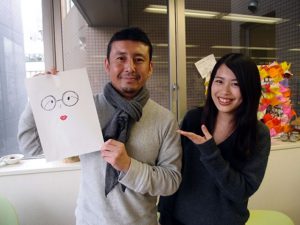[Original by Haruka SHIMIZU, 2015 Public Relations Intern (March 14, 2016); Translated by S. Thapa/Y. Nakamura/A. Guermont]
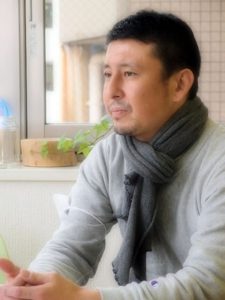
Hashimoto san is handsome and gentle, as a JVC staff member describes him as “Le Petit Prince (The Little Prince).”
Hello everyone, I am the public relations intern Haruka Shimuzu. Today, I will be interviewing Mr. Takahiko Hashimoto who was previously intern in the Palestine Project and is currently in charge of the JVC Calendar production*. Being a soccer star in his teens, travelling abroad the world in his twenty’s and a nursery school teacher in his thirties, the well versed and experienced Hashimoto san aims to “connect nursery school teaching with international cooperation”. I wonder what kind of stories he has to tell, so I can’t wait to hear them!
[*He is now in charge of the Sudan Project and stays at Khartoum from February 2017 (Note added in the English version).]
Firstly, I have heard that you can speak Arabic. Why did this happen?
Currently, I do not have the opportunities to speak Arabic, so I am not so fluent anymore, but, after I graduated high school, I went to a specialized school to learn Arabic. Arabic is a very difficult language, however, I think that it is very interesting, and abundantly expressive.
Why Arabic?
Since I was a child, I was interested in the archaeological ruins of Egypt. Looking at pictures of these ruins I used to love imagining and thinking about things like “ages ago, people used to live in these ruins.” During my second year at elementary school, I read a manga, which I borrowed from a girlfriend of mine, called “Crest of the Royal Family.” Reading this manga, I would think to myself, “In the future I want to try doing archaeology!” I bought a textbook on hieroglyphics, the writing form of ancient Egypt, and attempted to learn the fundamentals of archaeology by myself. Being engrossed with soccer during my high school days, I ended up missing my university entrance exams. Having said that, I began to feel that waiting for another chance to enter university was wasteful.
In this occasion, I thought to myself why not study Arabic which is very much in relation to Egypt’s ruins and archaeology. Thus, after graduating high school, I decided to attend a specialized Arabic school located in Mitaka (Tokyo) for two years. Within my first year of study, I accidentally learned that the Ministry of Foreign Affairs was recruiting personnel for the embassy in Jordan. I decided to apply and see what happens. By chance, I was accepted so I took a temporary break from my studies. I was 20 years old when I left for Jordan, and had the chance to work there for the embassy for two years.
At 20 years old, you went to work in a foreign country like Jordan, did you feel any uneasiness or insecurities?
To be honest, I cried on the plane on my way to Jordan (he laughs). Until then, I was excitedly light-hearted. However, in the plane, surrounded by many foreigners, I began to realize that my life abroad was actually starting. I suddenly felt lonely and uncomfortable; even though I was twenty years old I was ashamed and cried (he laughs).
However, having the opportunity to go abroad so young, was a very good experience. It enabled me to make money while living my life. Because all the staff that surrounded me was older than me, I was very spoiled and received a lot of love. In my days off from work, I would read books at the ancient ruins that I loved. At this time, Jordan wasn’t a popular sightseeing attraction, so it was a particularly peaceful atmosphere to do some leisurely reading. Additionally, I also went to local staffs homes to hang out. As they all could be my father, I called them “Abi,” which means “my father”, in Arabic.
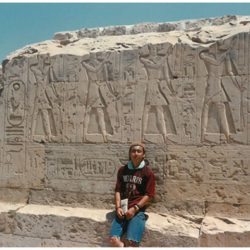
Visiting ruins in Egypt.
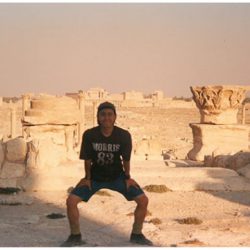
Hashimoto san in his twenty’s at Palmyra, Syria.
After returning to school, and graduating from the specialized Arabic school, what did you do?
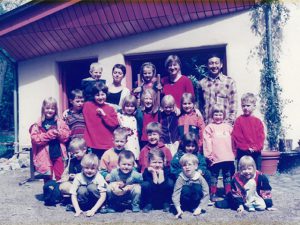
Hashimoto san studying the Steiner Education (back row, right).
After graduation, I went to Germany for approximately a year and a half to study children’s education. After returning to Japan, I became a nursery school teacher and worked for ten years.
Since I liked children from the start, I had already worked part-time at a nursery school during learning at the Arabic school. In reality, I understood that loving children alone was not enough to do my job—childcare is deeper than that. So after returning from Jordan, I returned to the Arabic school, and at the same time, started correspondent education to obtain children’s education license. After this, I went to Germany for around a year and a half through an internship-like opportunity to study children’s education. I did not earn any money from this and had to use the money I earned in Jordan, but, it was incredibly fun. First, I learned the German language after which I was able to practice at a nursery school that was based on Steiner Education. While being able to practice my German, I gradually started teaching in German. Looking back at it, I wonder if the things that I desired to do have come true.
What is Steiner Education?
It is difficult to explain in one word. However, it is a form of education that has its basis on the Christian way of thinking. It works under the premise that children have various types of inner spiritual sides. Birthed under the scholarship known as Anthroposophy, this manner of educational training encourages one to understand the children’s inner spirit and teach in a manner that will foster that spirit. For instance singing in a quiet room that matches Japanese nursery education.
In your opinion, are there any differences between Japanese and German nursery education?
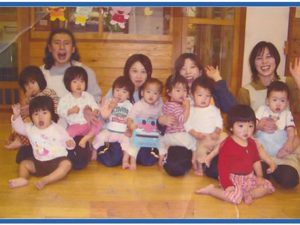
Funky Hashimoto san with dread hair (back, left).
Firstly, we have to be careful about the facts that the target age for nursery school and kindergarten are different, and the Steiner system is not necessarily a common childhood education in Germany…
A key feature of Japans nursery school education is that the education is divided by developmental age. (Although recently there has been increase in mixed aged education).
On the other hand, the German Steiner nursery education has mixed age early education from the ages of 3 to 6. The children receive training and education that respect the atmosphere of home. They have many toys that are made out of raw natural materials. They sing songs, and tell stories in rooms lit by natural and candle light.
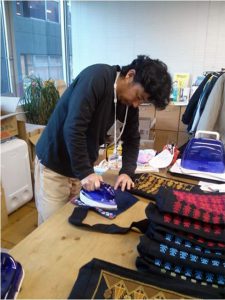
Hashimoto san in his JVC internship, managing Palestinian embroideries.
During my time working part time at the nursery school, I have come to know the Steiner education system. I read an introduction, which told that children are quiet and obedient under this education system.
I went to Germany thinking “If we applied this teaching method to nursery school teaching, would it be fun? I want to see this sort of witchcraft-like method with my own eyes.” But in reality, it seems no matter in which country you are, one thing that remains the same is that the children won’t listen to you. Anyway, it was very valuable for me to learn how to nurse children by getting along with them.
After returning to Japan from Germany and working 10 years at a nursery, why did you decide to do intern at JVC?
I learned a lot and grew greatly from the nursery school but, this was a 10 year break from the things I did as a young man. I was still interested in international cooperation. So I wondered how I could use the experiences I have earned during my youth to work towards this direction. Therefore, I quit the job, got a part-time job at a child care facility and began my internship with JVC.
Even though there were many field options, why did you choose to be the Palestine intern?
While I was working at the Japanese embassy in Jordan, I met Palestinian people for the first time. Many Palestinians live in Jordan, and some even work as staff members at the Embassy. At that time, I only knew about Schindler’s list, Anne Frank’s diary and the history of the prosecution of the Jewish people. But, I came to know the things Israel has done to Palestine and say and heard firsthand the current state of affairs of the Palestinian people. This made me think about many things. Because I had this experience, I decided to apply to become a Palestine Intern at JVC.
When I was near the end of my internship, the former calendar secretariat, Omura san, had become the new public relations officer. Thus, I was offered the calendar secretariat position. I had always been interested in fine arts and design, and wanted to maintain my relationship with JVC in some way; thus, I took the job and became the calendar secretariat. After this, I want to combine my special abilities, nursery school education and international cooperation in some way in the future.
By the way, Hashimoto san, you are a father of three children. Have you had any episodes or methods of training?
When I worked at the nursery school, I would speak with the parents or guardians of the kindergarteners on things like, “It is good to have individuality” or “It is okay if he can’t do it yet”. I would praise the kids and encourage growth. However, when it comes to my own kids, I have desire to remove their weaknesses and replace them by growing other abilities. I think to myself everyday—being a parent is very difficult.
I tell my kids three things everyday, “Don’t hurt others,” “Think about others before taking action,” and “Think by yourself.” I don’t want them to hurt other people, and hence, when they accidentally did such things without intention, I blamed them by crying together. I wish that children think what is the most important thing to do now, and what is the best way to convey their thought to others. For example, when they get bad result in exam, I tell them to check errors, take note and memorize them. However, in Hashimoto’s family, we also have a loose rule that one can be absent from school up to three days a year, if they have good reasons.
Lastly, as a Calendar Secretariat, please tell us what makes the JVC Calendar so fascinating?
The JVC calendar has become the face of JVC. It serves to spread the knowledge of JVC to many people. Every year, we sell about 15,000 calendars. Our office stock runs out little by little, it’s like a child leaving its nest so it makes me very happy.
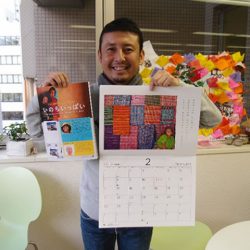
The calendar of the year 2016 accompanies poems by Syuntaro TANIKAWA.
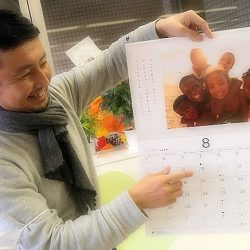
He explains every detail of the calendar with deep love.
[Haruka’s impression after the interview]
I was so much impressed by his gentle way of talking and his atmosphere, possibly because he has been working at a nursery. At the same time, I found his passion deep in mind. He has always faced things straightforward. His talk was so interesting, and it lacks time to get more from his drawers full of experience.
[Next interview]
The next person is “A smiling dynamo (named by Hashimoto san),” who always smiles and has big power to generate everything from nothing. Don’t miss it!
* The order of uploading the English version of “Staff Interview” is random and hence different from the order of the original Japanese version. We are sorry, but the person coming next may be different from the “next person to be interviewed” mentioned in the text.
Share This:
